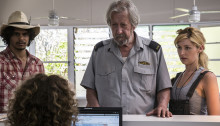 When I first saw Jeremy Sims’ Last Train to Freo (2006), a low-budget Australian thriller about four strangers travelling home in a single train carriage, I was struck by Sims’ ability to maintain an impressive amount of suspense throughout the film’s concise running time. But I was also a little underwhelmed by the characters in the film, feeling that they demonstrated a kind of flat grandiosity that would have worked beautifully on stage (Last Train to Freo was originally a stage play), but felt cartoonish on the big screen. Watching Sims’ latest film, Last Cab to Darwin, it’s clear that he has come a long way since 2006.
When I first saw Jeremy Sims’ Last Train to Freo (2006), a low-budget Australian thriller about four strangers travelling home in a single train carriage, I was struck by Sims’ ability to maintain an impressive amount of suspense throughout the film’s concise running time. But I was also a little underwhelmed by the characters in the film, feeling that they demonstrated a kind of flat grandiosity that would have worked beautifully on stage (Last Train to Freo was originally a stage play), but felt cartoonish on the big screen. Watching Sims’ latest film, Last Cab to Darwin, it’s clear that he has come a long way since 2006.
Like Sims’ directorial debut, Last Cab to Darwin was originally produced as a stage play. And like the play, the film is loosely based on the true story of Max Bell, a taxi driver who, after becoming terminally ill, drove 3000kms to Darwin to take advantage of the Northern Territory voluntary euthanasia laws that existed briefly between 1995 and 1997. By all reports, Bell was a difficult and anti-social man, finally prevented by various bureaucratic barriers from avoiding the painful death that terrified him.

Sims’ and writer-collaborator Reg Cribb have elected to reimagine Max’s story. In their narrative, Rex (Michael Caton) is the introspective but generally amicable cabbie who will pick up a couple of new friends as he travels towards Darwin, leaving behind his next-door neighbour Polly (Ningali Lawford-Wolf), with whom he has an unarticulated romantic relationship. The first of Rex’s new friends is Tilly (Mark Coles Smith), a young indigenous man whose poor decision making has led him down the wrong path. The second is Julie (Emma Hamilton), a young English nurse travelling across Australia. As might be expected, Rex’s entourage reawaken a spark in him, just as his wisdom and guidance provide powerful life lessons to each. Finally arriving in Darwin to meet Dr. Farmer (Jacki Weaver), Rex is struck by the immensity of his choices, and must pause to reflect.
Michael Caton, who might be known by some international viewers for his roles in the Australian classic The Castle (1997) or the abysmal Rob Schneider vehicle, The Animal (2001), delivers the performance of his career. Beautifully capturing the character’s quiet attempt to retreat from the emotional and physical pain that comes with a terminal diagnosis, Caton avoids any sense of contrivance. Lawford-Wolf is excellent as Caton’s long-suffering love interest, a role that looms large over the narrative despite her limited screen time. Equally, Smith is outstanding in a role that could have easily veered into cliché, instead providing a warm, believable, and surprisingly sympathetic portrayal of a young man on the precipice of self-destruction. Hamilton and Weaver both deliver within the confines of the roles they are given, but their talents are a little underutilised.
Aside from Sim’s mature direction and the exceptional performances, Steve Arnold’s still and earthy cinematography, focused on the juxtaposition of gorgeous landscapes and well-worn human faces, grounds the film in a particularly convincing Australian reality. Is the film perfect? Far from it. And some may find the narrative a little convenient and safe given the subject matter, especially when juxtaposed with the real life story on which it is based. But this is well made Australian cinema – gorgeously shot, beautifully acted and deeply moving. 2015 has been the biggest ever year for the Australian local box-office, and with the quality of the films being produced, it’s hardly a surprise.
Last Cab to Darwin is available on DVD in Australia from December 9th.

Comments
6 responses to “Reviewing Jeremy Sims’ “Last Cab to Darwin””
No worries, Pete.
A fine review, James. I’m curious about this film; not sure if it reached NYC yet, but I’ll look out for it.
Definitely worth a look if you come across it, Simon.
Sounds intriguing James. I like taxi movies. Night on Earth is my favorite Jarmusch, and Clu Gulager’s cameo in Karren Karagulian’s cab in Tangerine is lots of fun. Also sounds a little like Taste of Cherry though it probably is far removed from that. I’ll have to track it down.
It’s interesting – I hadn’t thought of it as a taxi movie, but I’ve noticed that taxi drivers have really taken to it. So I guess it IS a taxi movie!
Thanks for the introduction to this one, James, as I didn’t know about it at all.
In many ways, it looks typically Australian, in a good way that is, and I will look forward to seeing it one of these days.
Best wishes, Pete.